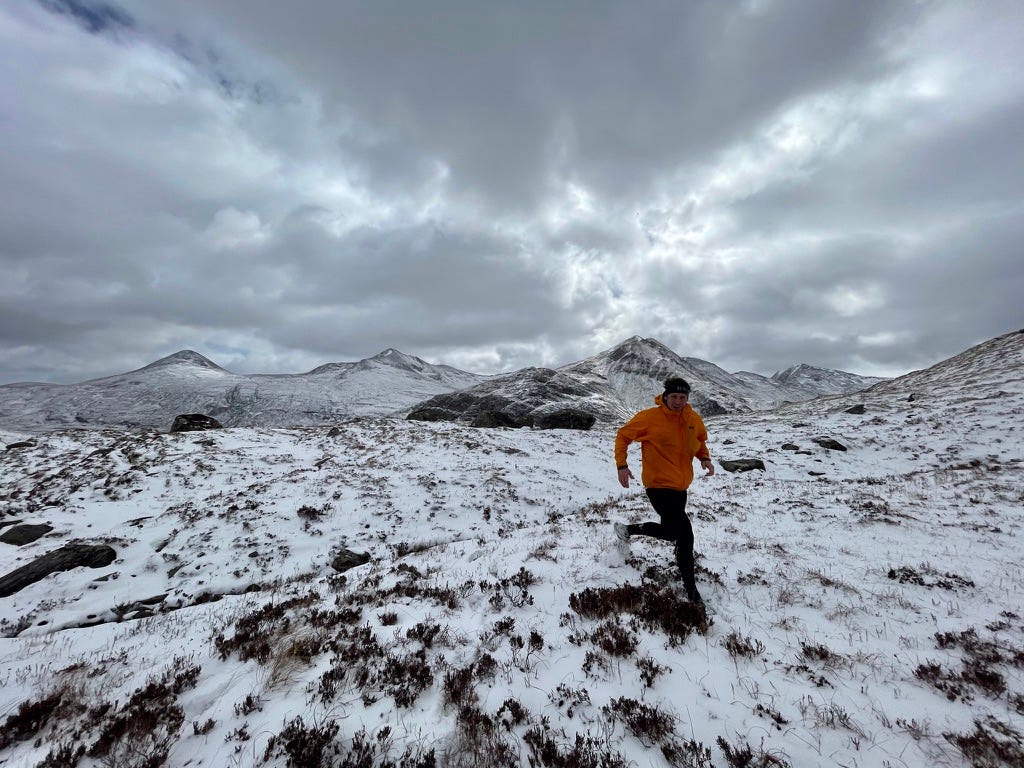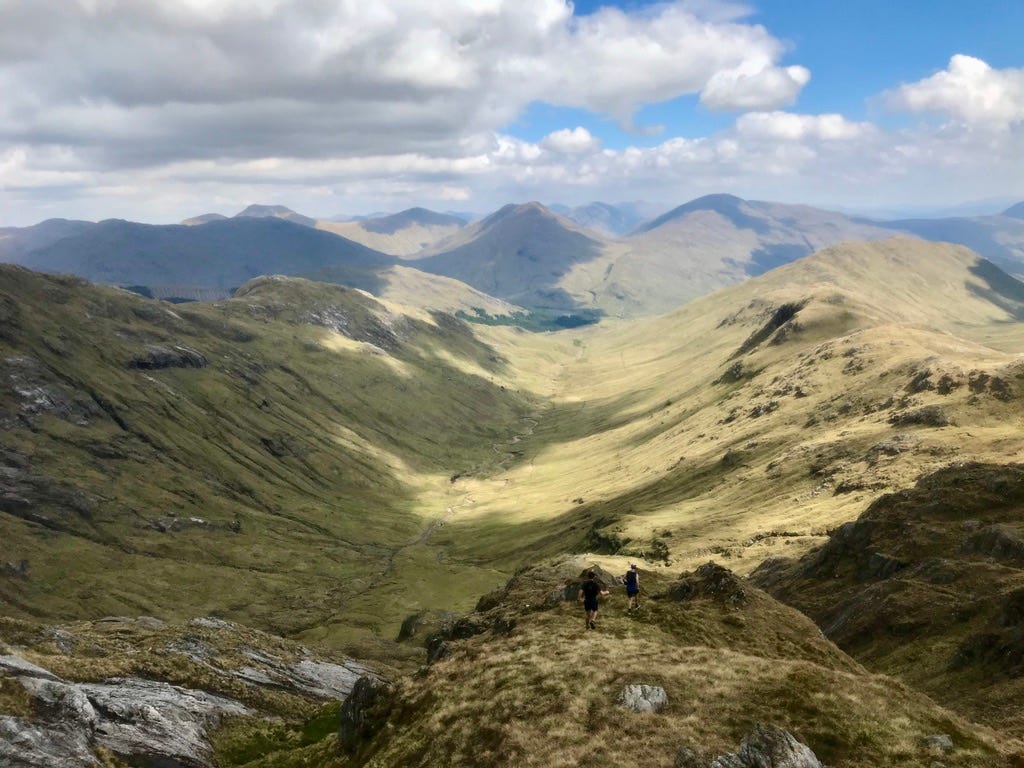On Strava and Running Declarations
It’s that time of year where Strava is abuzz with new and old runners beginning and beginning again. Bold statements of intent are lit up in a white and orange blaze of 5ks and enthusiastic declarations of future running intent.
Nothing wrong with that, of course, if it works for you. But in reality most of this enthusiasm will peter out, and sometimes the public sharing of goals can be the death knells.
I’ve learned that voicing or sharing my targets isn’t always useful. I hoist them gingerly, hoping that raising the banner of intent will somehow magic them into existence.
But it’s not that simple.
Setting unrealistic targets is too easy. It makes it easier to shift the goalposts when the target drifts, but this is just a way of gently quitting. Right now I’m drinking a beer after declaring I was giving up beer just a few days ago.1
Actually stating your goal (or posting it on Strava) often has a counter effect. In your head you’ve gone “now I’ve said it, I’ll definitely do it.” But actually, it often works in the opposite way - now it’s offloaded you might feel like you’ve already done it. It’s a bit like me and my lists.
Declarations of goals can mean you’re either heaping pressure on yourself when the hard work hasn’t started, or you’re already looking for feedback and gratification when you’ve done nothing to deserve it. Either way it’s no way to start, at least not for me.
Strava can be a polarising sort of place, even from an individual perspective. I see lots of good in it, but occasionally this is offset by things I think are Really Bad.
On balance, I’m mostly for it. I mean, I use it nearly every run, and before starting a Twitter account in November it was the closest thing I had to social media. My justification for this was that it’s not really like social media, but in many ways it is. You’re still tapping that little thumb icon (not always based on the quality of the post) and you’re still getting a little dopamine hit when someone does it for you.
And of course you’re still using it to compare yourself to others, despite how well you know that comparison is the thief of joy.2
But…and here’s the rub…there’s no negativity on Strava. At least not in my feed.
I’ve no doubt it exists, as it does in nearly all places where the human animal gathers online, but in my experience it’s always been an overtly positive place where nary a negative comment is seen.3
At various times Strava has definitely given me motivation, inspiration and a sense of purpose for running. That’s slightly embarrassing to write, but that doesn’t make it any less true.
I know I’m not alone. It’s virtually synonymous with running for millions of people. If it’s not on Strava, it didn’t happen, or so the saying goes.
I feel a sense of accountability to my statistics. Seeing what I’ve done (or not) in comparison to others (or just my own silent benchmarks) has often given me the impetus I needed to get moving.
And honestly, I love seeing people on their own running journeys, be that PBs and training miles, or simply discovering the joy of running for the first time. The latter was me not so long ago, out there alone - as necessary with trail running - but with a community in the background where people understood and appreciated the efforts.
But I’m not a slave to it, and I’ve got some pretty major reservations that have led to periods where I’ve stopped using it altogether.
Are we outsourcing our wildernesses in service of ego, for example?
My greatest worry is that we’re giving up wild and secret places to a tech company, and that our love of these places is being weaponised and monetised in a way that will destroy them. (Incidentally, that’s the pitch if there’s anyone reading that wants to pay me for an investigative piece on this!)
There are places I’ll never set segments, and although I’d be both upset and possibly angry if anyone did, I know that I have no right to be. I can’t stop it, and I’m absolutely complicit in use (and misuse) of the platform.
Ask yourself what Strava is getting in return for your free use of their software? They have leveraged our love of the outdoors and exercise against our egos in order to claim our attention, and it’s worked.
My nightmare is that at some point there will exist Trail Running Guides to Town X, produced and sold by Strava, ready to be uploaded and blindly followed.
And not only will we suffer the fallout from this in terms of increased tourism, land pressures and the death of quiet places, but we’ll have contributed the data that made it possible.
On his recent podcast, Finlay Wild spoke to Alec Keith about years of hill running adventures and had an interesting back and forth about the use of Strava (from about the hour mark onwards). Finlay uses it extensively, of course, whereas Alec Keith never has.
In short, Keith’s argument is that Strava removes some of the joys of discovery and adventure. This is certainly true, and in my mind it would also seem to contradict the long established hill running aesthetic of self-sufficiency and doing things simply.
This is why Wild’s Strava use is interesting - everything else he does fits traditional aesthetics. He has no coach, seemingly trains by feel rather than routine, and favours his challenges solo and unsupported.
His counter to Keith’s view is that Strava can provide inspiration for people, which is also true. However, he does express surprise that someone had used a GPX file from his Strava, and he is rightly concerned about the implications this might have for people accessing mountainous terrain without sufficient experience or navigational skill.
In a perfect world perhaps we wouldn’t use Strava at all. We’d all be out forging our own paths and learning as we go, toiling away without the need for kudos or concern for time. But in some degree or form we’re all driven by ego, efficiency or curiosity, and so we do.4
But I suppose, in context of global issues and human frailties, taking a little pleasure from logging a few miles on Strava isn’t too bad.
News and Notes
Apologies and commiserations to John Kelly, who bailed on his solo, unsupported Ramsay Round attempt shortly after I posted last week. The commiserations are for the valiant but failed attempt, which you can read about here, and the apologies are for my slanderous error in last week’s post when I suggested that he may have stashed some provisions at the checkpoint at Loch Treig dam. He quite correctly (and very politely) highlighted my error via Twitter, and now I know that “unsupported” means you need to carry everything yourself, whereas “self-supported” means you can leave a food cache in advance, or similar. Thanks to John for the correction and best of luck for a future attempt!
I enjoyed reading about this guy who just finished running every street in Glasgow. (With a nod to Rickey Gates, naturally).
And this guy just ran 100 miles in under 11 hours. That’s under 6.30/mile, folks, and that’s utterly fucking bonkers.
I just discovered #stravawankers and both wish I’d found it sooner and hope I’ve never been featured!
Melanie challenged me as soon as I opened it, but I reminded her I hadn’t said I was giving up drinking beer, only that I was giving up drinking beer every day.
It’s mildly defensible that the comparisons you’re making are mainly to do with effort and talent, as opposed to how pert your lips are.
It’s worth mentioning, of course, that gushing positivity can cause just as much ire as negativity, because you know it’s often disingenuous. I’m sure many of us have witnessed that on Strava. It’s far from perfect. But on balance I think I’d take sickly sweet over bitter and spiteful.
In a more perfect world maybe people would just have more considered use of Strava - including giving segments decent names!









